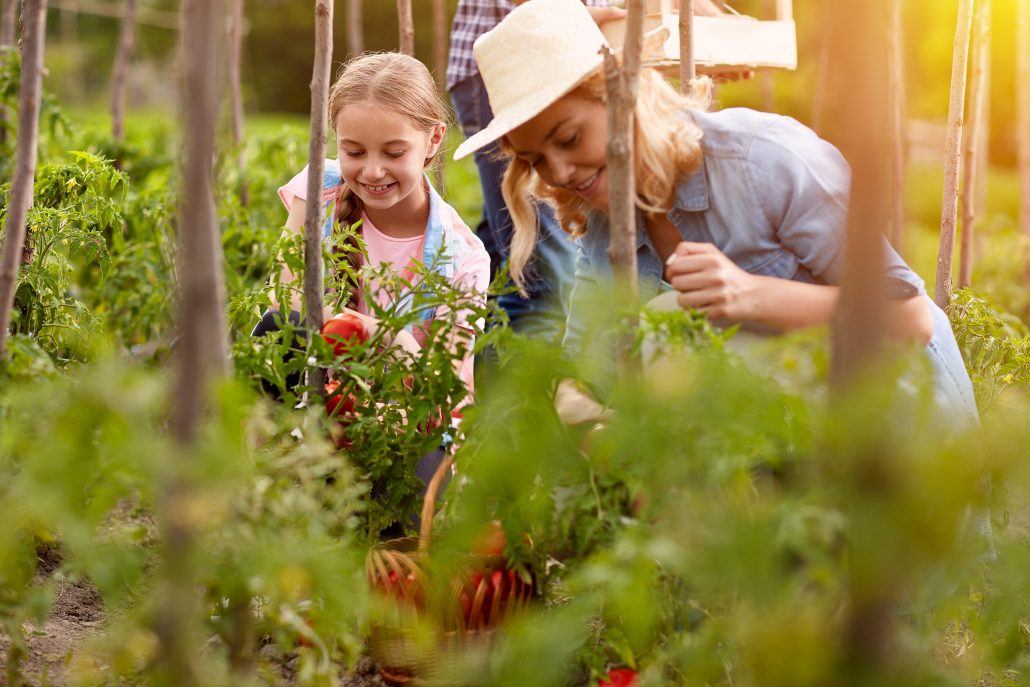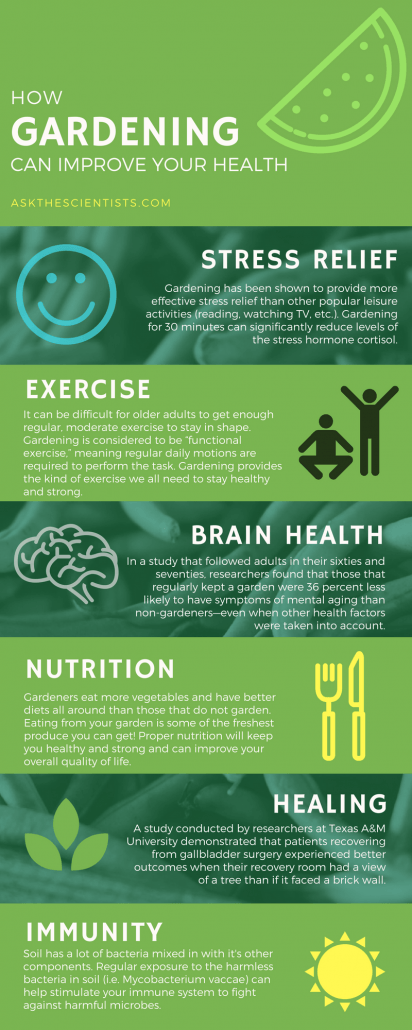Growing Health in the Garden
Exercising and eating right are said to go hand-in-hand, but when you work in a garden, they actually do. Gardening is one way to maintain your health and enjoy time outside. It’s a great way to keep fruits and vegetables in your diet, and get some exercise. Growing your own food is also healthy and sustainable for the environment. See how learning to garden can improve your quality of life.
Gardening Improves and Promotes Healthy Nutrition
Gardening is a hobby that can easily and effectively increase your daily access to healthy foods. Nutritious snacks and delicious dinners are only a stone’s throw away when you regularly keep a garden. Whether you garden at home or with your community, regular access to fruits and vegetables improve your nutrition.
Surveys of children whose schools have after-hours gardening programs illuminate how beneficial gardening can be for individual nutrition. Teachers at schools with these programs can utilize the garden in developing health and nutrition curriculum.
A 2005 study of fourth grade classrooms with after-school gardening programs provides a great example. In the study, teachers reported the eating habits of their students had improved with regular access to their school’s garden. Principals reported a nearly two-fold increase in use of the cafeteria salad bar by students.
The students also illuminated the health benefits of the school garden in their personal nutrition. Fourth graders were surveyed before and after the incorporation of the school garden into the curriculum. They answered two yes/no questions: “I eat vegetables every day,” and “I am physically active every day.” There was a significant increase in the proportion of students answering affirmatively after participating in the gardening program.
Gardening Provides Exercise on a Daily Basis
It should be noted that in the study mentioned in the previous section, children who participated in after-school gardening programs increased their daily vegetable intake AND their daily exercise. Gardening gets your body to work and gets you into nature.
Gardens require daily care in order to produce plentiful crops. Harvesting the rewards of a diligently kept garden can motivate gardeners to get up and move. Gardening provides the body with moderate cardiovascular exercise. Regular exercise of any kind, including gardening, reduces the risk of heart disease and can improve strength and stamina.
Older-aged populations can have trouble finding regular exercise regimens for which they feel well-suited. Gardening is great functional exercise for everyone, including the elderly. Functional exercise refers to activities that include: stretching, pushing, pulling, lifting, squatting, etc. These activities all improve muscle tone and flexibility, and improve general well-being.
Gardening Improves Self-Perception of Mental Health
Gardening has been called good for the soul. There are actually several aspects of this hobby that make that description accurate.
Gardening promotes mental and physical health. When you garden, you interact with nature on a regular basis. It also gives you a chance to serve others. Simply put, gardening makes us feel good.
A number of studies have recently reinforced the importance of our relationship with nature. Being immersed in nature, including a garden, opens the door for creativity to bloom. Unplugging from technology and stepping outside to do work in the garden is refreshing for the mind and spirit.
The physical exertion required in gardening helps maintain blood pressure in the normal range and increases your production of endorphins. Endorphins have been referred to as “feel-good” hormones because they help us feel happy and full of life. Endorphins are also crucial in reducing stress. That’s why so many people take up gardening as a stress-relieving hobby.
Gardening Can Establish Community and Boost Civic Engagement
In addition to relieving stress, gardening also provides opportunities to serve others. After working in a community garden, many gardeners give their extra fruits and vegetables to friends and neighbors. This kind of community engagement and service encourages a healthy mental state and helps build strong communities.
Community gardens have been increasingly popular in neighborhoods far from a dependable source of produce, like farmer’s markets and grocery stores. Community gardens are also almost always free to use or require very little in order to participate.
Several communities in the United States and abroad have adopted community garden models. Notably, the California Healthy Cities initiative of 1988 has established fully functional and busy community gardens all over the state. These gardens are funded through grants and city budgets, and are staffed by volunteers and garden experts.
Community members have access to cooking classes, healthy meal-preparation instruction, and gardening help through these local programs. Skill-building opportunities for participants, involvement of volunteers, and commitment of local leadership have made especially successful community gardens.
Community gardens have continued to flourish in cities across the globe because they promote public health and a high quality of life. They encourage healthy living and eating, community engagement, and civic and neighborhood pride. These gardens also promote sustainability and the local environment.
Summary
Gardening, in your own yard or as a community, is a great exercise in proper health and nutrition. Being active in your garden relieves stress and provides your body with regular exercise. Gardening can also give you the chance to build a deeper relationship with nature, which has been shown to improve mental health. Community engagement and neighborhood pride come as a result of spending quality time in your garden. Take the chance to develop your green thumb and try gardening.
- Eliades, Angelo. “Wellbeing Gardening – Gardening for the Body, Mind & Spirit.” The Permaculture Research Institute. N.p., 03 June 2016. Web. 05 July 2017.
- McDonald, Laura. “9 Reasons Gardening Is The Ultimate Mind-Body Workout.” Mindbodygreen. N.p., 15 Apr. 2015. Web. 10 July 2017.
- Twiss, Joan, Joy Dickinson, Shirley Duma, Tanya Kleinman, Heather Paulsen, and Liz Rilveria. “Community Gardens: Lessons Learned From California Healthy Cities and Communities.” American Journal of Public Health9 (2003): 1435-438. Web. 6 July 2017.
- Wakefield, S., F. Yeudall, C. Taron, J. Reynolds, and A. Skinner. “Growing urban health: Community gardening in South-East Toronto.” Health Promotion International2 (2007): 92-101.
- Williams, Florence. “This Is Your Brain on Nature.” National Geographic 6 July 2017.














